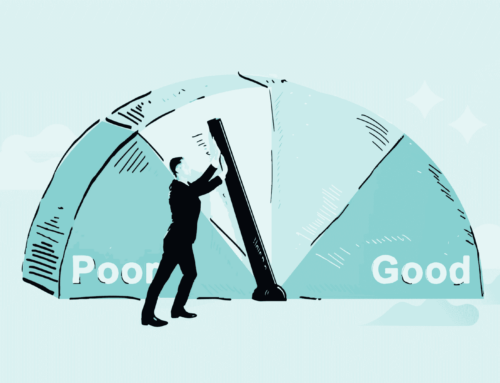November marks the 10th anniversary of Financial Literacy Month in Canada. This month, we want to help you on your journey to learning about your personal finances. Firstly, let us provide you with industry tips on three key areas of your personal finances: Credit, Debt and Budgeting. This week, we will discuss How to Improve Your Credit Score.
Your credit score is a three-digit number that lenders use to help them decide whether you’re financially responsible or not. For example, lenders will use your score to decide how likely it is you will repay your loan or credit back on time. Therefore, it is an important factor in your financial life. The higher the credit score, the better. Most importantly, a higher score will allow you to easily qualify for loans or credit cards at more favourable terms. This will save you money in the long term. But if you’re currently faced with a poor score, how do you go about improving your credit score and obtaining good credit?
If your credit score is not where you’d like it to be, you’re not alone. Improving your credit scores takes time. But the sooner you address the issues that might be dragging it down, the faster your credit scores will go up. You can increase your scores by taking several steps. For instance, establishing a track record of paying bills on time, obtaining a secured credit card, paying down debt and taking advantage of tools like Score-Up, Marble Maestro and MyMarble. Let’s learn more.
How Are Credit Scores Calculated?
You’re probably wondering how lenders come up with this magical three-digit number that weighs a lot on your financial future. Firstly, before learning how to improve your credit score, it’s important to understand how your credit score is calculated.
Many companies have their own proprietary formula for computing the credit score number. But it is common that they all calculate using five major categories. Check it out:
- Payment history (35%)
- Credit utilization rate (30%)
- Length of credit history (15%)
- New credit (10%)
- Type of credit used (10%)
As you can see, the two most important factors are your payment history and the amount owed. Firstly, payment history takes into account whether you have paid your credit account consistently and on-time. It also takes into consideration factors such as previous bankruptcies, collections and delinquencies. It considers the severity of each issue and how long it took to resolve it. In conclusion, the more payment issues you have in your credit history, the lower your credit score.
Secondly, you will see the next largest component which is the amount you currently owe towards your available credit. This factor is important to lenders, as they will view you as unreliable or risk if you’re constantly spending up to or above your credit limit. Your lenders preferably like to see your credit utilization ratio below 30%. This means, if your total credit limit (including all credit cards) is $3000, you should only have used 30% of this.
When it comes to the length of your credit history, new credit and type of credit, these categories are self-explanatory. Your lenders prefer to see someone who has a long credit history, with a mix of credit accounts in good standing.
How to Improve Your Credit Score?
Following on from how your credit score is calculated, these are generally ways to look at when searching to improve your score. Since the factors make up your score, they will help you figure out what to do to boost your score too.
- Pay your bills on time. It’s important to at least make your minimum payment to your credit accounts. In other words, If you miss a payment, this will affect your payment history calculation of your score.
- Keep an eye on your credit utilization rate. This relates directly to the amount owed, which is 30% of your credit score. Because of this, it’s important to make sure you don’t use any more than 30% of your available credit. As mentioned previously, your lender doesn’t like to see you using too much of your available credit, as it hints to them you may be a potential risk.
- Be particular when opening new credit card accounts. If you’re applying for new credit cards quite often, your lender may feel this is irresponsible. This implies you may be short on cash and looking for more and more credit. It’s important to only apply for credit when you need it. Above all, always check your credit score before you apply for credit, to confirm your chances of approval at the terms you want.
- Alert banks and card companies when you move. If your address isn’t correct, your bill may not come to you. This may cause a missed payment which will affect your credit score.
- Check your accounts online. You can also be positive you’re not missing your payments by checking your online accounts.
- Pay off delinquent bills. Make sure to pay off your delinquent accounts. However, they may not be removed from your history. But it can make you look better to creditors.
- Check your credit report for inaccuracies. Sometimes, your creditor may have information that isn’t up to date, or incorrect. The credit reporting agencies make it easy for you to dispute these inaccuracies.
How Financial Literacy Can Help You Improve Your Credit Score?
Financial literacy and education are essential to effectively manage your personal finances. Whether you’re searching to learn about your budgeting, debt or credit, the right resources can help you amplify your finances. When it comes to your credit score, there are many steps you can take to improve it. But we believe a key component in improving your credit score is educating yourself on your credit.
Our Maestro courses can help you learn the fundamental principles on how to monitor and improve your credit score. Our modules will show you how to read your credit report, understand your credit and how it works, tips to increase your score and more.
After graduating from this course, you will have the power to gain great credit by utilizing the course content at the MyMarble platform. You can take our MyCredit Maestro course online for free here: https://learn.mymarble.ca/bundles/mycredit
How Score-Up Can Help You Improve Your Credit Score?
Score-Up is a financial technology solution that will help you boost your credit score in as little as 30-45 days. Through this technology, you can create a credit score target based on your financial plans and credit history. From here, our software then analyzes your credit report to develop a fast and clear path to improve your credit score. This means we will provide you with personalized and real-time recommendations on the exact steps you need to take to achieve your score.
For example, if you have $100 spare at the end of the month, you can let Score-Up know this through our Money Simulator and allow our technology to recommend what debts you should pay off, and when, that will help you gain the most credit points. We will talk more about the different kinds of Simulator and other functions available in this course, too.






